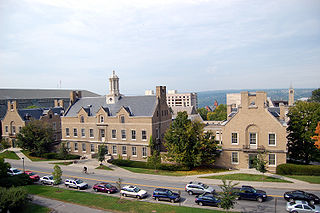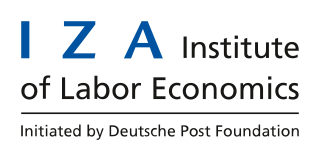Related Research Articles

The New York State School of Industrial and Labor Relations at Cornell University (ILR) is an industrial relations school and one of Cornell University's four statutory colleges. The School has five academic departments which include: Labor Economics, Human Resource Management, Global Labor and Work, Organizational Behavior, and Statistics & Data Science.
The Harris–Todaro model, named after John R. Harris and Michael Todaro, is an economic model developed in 1970 and used in development economics and welfare economics to explain some of the issues concerning rural-urban migration. The main assumption of the model is that the migration decision is based on expected income differentials between rural and urban areas rather than just wage differentials. This implies that rural-urban migration in a context of high urban unemployment can be economically rational if expected urban income exceeds expected rural income.

Dale Thomas Mortensen was an American economist, a professor at Northwestern University, and a winner of the Nobel Memorial Prize in Economic Sciences.

The IZA – Institute of Labor Economics, until 2016 referred to as the Institute for the Study of Labor (IZA), is a private, independent economic research institute and academic network focused on the analysis of global labor markets and headquartered in Bonn, Germany.
Graduate unemployment, or educated unemployment, is unemployment among people with an academic degree.

Francine Dee Blau is an American economist and professor of economics as well as Industrial and Labor Relations at Cornell University. In 2010, Blau was the first woman to receive the IZA Prize in Labor Economics for her "seminal contributions to the economic analysis of labor market inequality." She was awarded the 2017 Jacob Mincer Award by the Society of Labor Economists in recognition of lifetime of contributions to the field of labor economics.

Adriana Debora Kugler is an American economist who serves as a member of the Federal Reserve Board of Governors. She previously served as U.S. executive director at the World Bank, nominated by President Joe Biden and confirmed by the U.S. Senate in April 2022. She is a professor of public policy at Georgetown University's McCourt School of Public Policy and is currently on leave from her tenured position at Georgetown. She served as the Chief Economist to U.S. Labor Secretary Hilda L. Solis from September 6, 2011 to January 4, 2013.

John Maron Abowd is the Associate director for research and methodology and chief scientist of the US Census Bureau, where he serves on leave from his position as the Edmund Ezra Day Professor of Economics, professor of information science, and member of the Department of Statistical Science at Cornell University.
Joseph Gerard Altonji is an American economist and the Thomas DeWitt Cuyler Professor of Economics at Yale University. His fields of interest include macroeconomics and applied econometrics and in particular labour economics, being ranked as one of the foremost labour economists worldwide. In 2018, his contributions to the analysis of labour supply, family economics and discrimination were rewarded with the IZA Prize in Labor Economics.

David H. Autor is an American economist, public policy scholar, and professor of economics at the Massachusetts Institute of Technology (MIT), where he also acts as co-director of the School Effectiveness and Inequality Initiative. Although Autor has contributed to a variety of fields in economics his research generally focuses on topics from labor economics.
Henry Stuart Farber is an American economist and the Hughes-Rogers Professor of Economics at Princeton University. His research revolves around different topics related to labor economics, econometrics, law and economics, and industrial relations.

Clair Brown is an American economist who is Professor of Economics and Director of the Center for Work, Technology, and Society at the University of California, Berkeley. Brown is a past Director of the Institute of Industrial Relations (IRLE) at UC Berkeley. Brown has published research on many aspects of how economies function, including high-tech industries, development engineering, the standard of living, wage determination, poverty, and unemployment.

Stephen Jonathan Machin is a British economist and professor of economics at the London School of Economics (LSE). Moreover, he is currently director of the Centre for Economic Performance (CEP) and is a fellow of the British Academy, the Society of Labor Economists and the European Economic Association. His current research interests include labour market inequality, the economics of education, and the economics of crime.
Ragui A. Assaad is an Egyptian economist and Professor of Planning and Public Affairs at the Humphrey School of Public Affairs. His research interests include labour economics, inequality and the economics of education. He ranks among the most prominent economists of Egypt.

Pierre Cahuc is a French economist who currently works as Professor of Economics at Sciences Po. He is Program Director for the IZA Institute of Labor Economics's programme "Labour Markets" and research fellow at CEPR. His research focuses mainly on labour economics and its relationship with macroeconomics. In 2001, he was awarded the Prize of the Best Young Economist of France for his contributions to economic research. He belongs to the most highly cited economists in France and Europe's leading labour economists.
Patrick McGraw Kline is an U.S. American economist and Professor of Economics of the University of California at Berkeley. In 2018, his research was awarded the Sherwin Rosen Prize by the Society of Labor Economists for "outstanding contributions in the field of labor economics". In 2020, he was awarded the prestigious IZA Young Labor Economist Award.
Lorraine Margaret Dearden is an Australo-British economist and professor of economics and social statistics at the Department of Social Science of the Institute of Education, University College London. Her research focuses on the economics of education.
Aysit Tansel is a Turkish economist and Professor of Economics at the Middle East Technical University in Ankara. Her research revolves mainly around labour economics, with a focus on the economics of education. She ranks among the foremost Turkish economists in terms of research output.
Xin Meng is a Chinese economist and professor at the Research School of Economics, College of Business and Economics (CBE), Australian National University (ANU). She is also a member of the Association for Comparative Economic Studies, the American Economic Association, the Society of Labor Economics and Royal Economic Society. Her main research interests include Labour Economics, Development Economics, Applied Microeconomics and Economics of Education. She focuses on researching issues about the Chinese labour market during transition, the influence of corporations and gender discrimination, the economic assimilation of immigrants and the economic implications of major catastrophes. Meng was elected a Fellow of the Academy of the Social Sciences in Australia in 2008.
Susan N. Houseman is an American economist who is the vice president and director of research at the W. E. Upjohn Institute for Employment Research. She is also a member of the National Bureau of Economic Research Conference on Research on Income and Wealth, chairs the Technical Advisory Committee of the U.S. Bureau of Labor Statistics, and co-directs the Labor Statistics Program at the IZA Institute of Labor Economics.
References
- ↑ Notice de personne: Fields, Gary S., Bibliothèque nationale de France. Accessed October 14, 2019.
- ↑ Profile of Gary Field on ILR School's website at Cornell University
- ↑ IZA Prize statement 2014
- ↑ Curriculum Vitae of Gary S. Fields, p. 2
- ↑ Curriculum Vitae of Gary S. Fields, pp. 2–3.
- ↑ Profile of Gary Field on ILR School's website at Cornell University.
- ↑ Fields, Gary (2019). "Self-employment and poverty in developing countries". IZA World of Labor. doi: 10.15185/izawol.60.v2 . hdl: 1813/76085 . Retrieved 23 April 2021.
- ↑ Curriculum Vitae of Gary S. Fields, p. 2
- ↑ Statistics of Gary S. Fields' profile on IDEAS/RePEc
- ↑ Fields, Gary S. (1975). "Rural-urban migration, urban unemployment and underemployment, and job-search activity in LDCs". Journal of Development Economics. 2 (2): 165–187. doi:10.1016/0304-3878(75)90014-0. hdl:1813/74321. PMID 12265914.
- ↑ Fields, Gary S.; Ok, Efe A. (1996). "The Meaning and Measurement of Income Mobility". Journal of Economic Theory. 71 (2): 349–377. doi:10.1006/jeth.1996.0125.
- ↑ Gary Fields: The link between jobs, unemployment, and poverty. Video published by the World Bank Jobs Group on YouTube on November 17th, 2014 and accessed on March 24th, 2015.